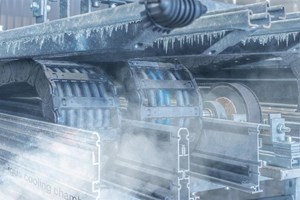In the course of its test laboratory expansion, the cable manufacturer and motion plastics specialist igus has set up another 40-foot container to carry out cable tests at extreme temperatures under real conditions.
As a result, igus is the only cable manufacturer capable of providing guaranteed temperature ratings for fixed cables, moving cables, and also for cables in energy chains.
Continuous movements alone are a challenge for cables, but how do cables behave at extreme temperatures of -40 degrees Celsius or +60 degrees Celsius?
There are indeed international standards for moving cables on the market, but they do not provide reliable information about the service life of moving cables at low or high temperatures in use in energy chains.
For this reason, the cable expert igus has been testing its cables in continuous motion for a period of over ten years in these conditions and has now set up another test rig.
“As part of our test lab extension to 2,750 square metres, the second 40-foot climatic test chamber enables us to carry out high and low temperature tests simultaneously,” explains Justin Leonard, the-chain director, igus. “This separation gives us more precise test results, which enables us to provide our customers with a guaranteed service-life for our chainflex cables – whether running at -40degC or +60degC.”

igus cables at extreme temperature
In each of the test chambers, energy chains are populated with cables and tested under real-life conditions at various speeds.
The varying temperatures in applications under these conditions are as different as the problems that can arise. In the case of extremely low temperatures, jacket ruptures are the biggest challenge.
Excessive heat, on the other hand, can run the risk of distorting the core formation. As a result, for example, single strand breakage or the so-called ‘corkscrew’ effect can occur. In addition, problems associated with condensing water caused by rapid temperature changes can be highlighted.
“We not only provide the information on the specific temperatures in which a cable is suitable for fixed installation, as well as for the movement according to the standard cold winding test, we can also specify a temperature for each chainflex cable in which the cable can move with guaranteed reliability in an e-chain,” added Leonard.
For details on appropriate bending radius and the permissible temperature for every cable in the chainflex catalogue, visit: www.igus.co.uk/chainflex



